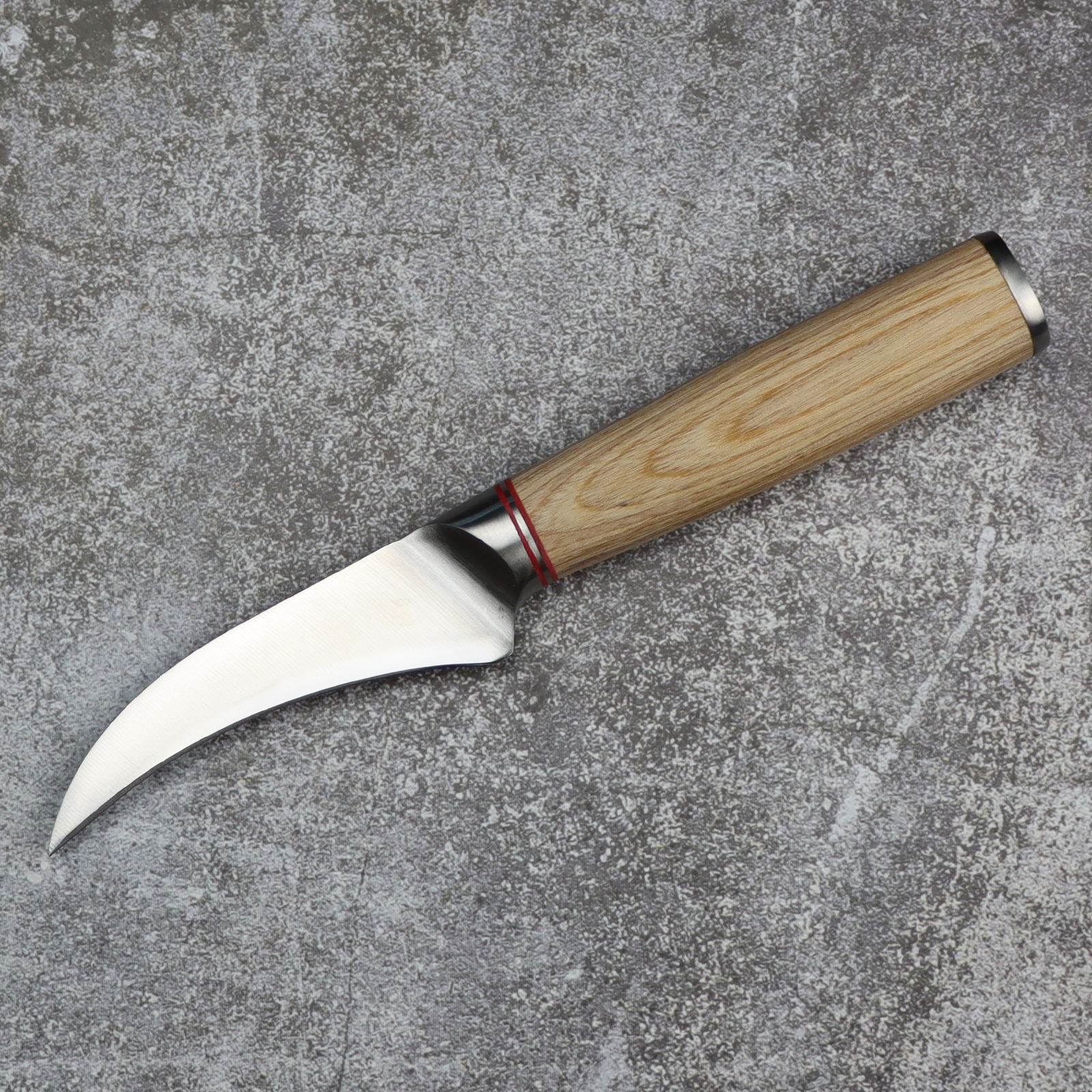Everything You Need to Know About Olive Wood
May 28,2024 | Fzkaly
What is Olive Wood?
Olive wood comes from the olive tree (Olea europaea), often called the "tree of life". Olive wood is derived from the olive tree (Olea europaea), native to the Mediterranean region. Known for its intricate grain patterns and rich, golden hues, olive wood is not only visually appealing but also highly functional. The wood is dense, strong, and moisture-resistant, making it perfect for various uses. This is especially true for high-quality knife handles, where durability and performance are essential.

Why is Olive Wood So Precious?
Several factors contribute to the preciousness of olive wood:
Rarity: Olive trees grow slowly, and it takes many years to develop the dense, beautifully-grained wood that is highly sought after.
Sustainability: Olive wood is often harvested from pruned branches or old trees that no longer produce olives, ensuring a sustainable and environmentally friendly source.
Unique Grain Patterns: Each piece of olive wood has extraordinary and unique grain patterns, making every item crafted from it one-of-a-kind.
Distinctive Fragrance: Olive wood emits a distinctive and inviting fragrance that adds to its appeal.
Aging Beauty: As olive wood ages, it becomes darker, richer, and more beautiful in color.
Working Characteristics: The wood is hard, strong, and has excellent working characteristics making it a favorite for woodturning and carving.
Smooth Finish: Olive wood finishes very smoothly, achieving a high polish that enhances its natural beauty.
Cultural Significance: Olive wood holds sentimental and religious significance in many cultures and has been used for religious, historical, and artistic artifacts.

Great Uses of Olive Wood
The distinctive patterns and warm colors of olive wood make each piece unique and highly desirable for artisanal crafts and high-end products, including:
Kitchen Utensils: Olive wood's hardness and resistance to odors make it ideal for cutting boards, spoons, and bowls.
Furniture: Its strength and beauty make olive wood perfect for creating durable and elegant furniture pieces.
Decorative Items: From intricate carvings to beautiful bowls and trays, olive wood adds a touch of luxury to any home.
Why Olive Wood Handle Kitchen Knife is Good?
Using olive wood for knife handles offers numerous advantages, making it a preferred choice for chefs and home cooks alike:
1. Ergonomics and Comfort
Olive wood handles provide an excellent grip, ensuring comfort during prolonged use. The natural texture and shape of the wood fit comfortably in the hand, reducing fatigue and enhancing control.
2. Durability and Strength
Olive wood is known for its hardness and density, making it an ideal material for knife handles that need to withstand regular use. Its resistance to moisture and odors ensures that the handles remain in excellent condition even in the demanding environment of a kitchen.
3. Aesthetic Beauty
Each olive wood handle is unique, showcasing stunning grain patterns and rich colors ranging from creamy beige to dark brown. This natural beauty adds a touch of elegance and sophistication to your kitchen tools.
4. Stability and Balance
The weight and balance of a knife are crucial for precision and ease of use. Olive wood handles provide a stable and well-balanced grip, enhancing the knife's overall performance.

Olive Wood Near Me
Fzkaly Olive Wood Steak Knives

These steak knives feature sharp, precision blades combined with ergonomic olive wood handles. They offer excellent control and a comfortable grip, making them perfect for enjoying your favorite cuts of meat.
Fzkaly Olive Wood Handle Kitchen Knives
Designed for versatility, these kitchen knives are ideal for a range of tasks from chopping vegetables to slicing meat. The olive wood handles ensure a secure grip, enhancing your cutting accuracy and safety.

How to Take Care of Knives with Olive Wood Handles
Proper care is essential to maintain the beauty and functionality of your olive wood handle knives. Here are some tips:
Hand Wash Only: Always hand wash your knives with mild soap and water. Avoid soaking them or using the dishwasher, as this can damage the wood and the blade.
Dry Immediately: After washing, dry the knives thoroughly to prevent moisture from affecting the wood.
Oil Regularly: Periodically apply a food-safe mineral oil to the handles. This helps maintain the wood's luster and prevents it from drying out and cracking.
Store Properly: Store your knives in a knife block, on a magnetic strip, or in a sheath to protect both the blades and handles from damage.
Frequently Asked Questions About Olive Wood Knife Handles
Q: Is olive wood eco-friendly?
A: Yes, olive wood is often harvested from pruned branches or old, non-fruit-bearing trees, making it a sustainable and environmentally friendly choice.
Q: Can olive wood handles withstand heavy use?
A: Absolutely. Olive wood is dense and durable, making it perfect for handles that need to endure frequent and heavy use.
Q: How often should I oil my olive wood handles?
A: Oiling every few months should be sufficient to keep the wood in good condition, though the frequency may vary based on use and climate conditions.
In conclusion, olive wood items are elegant, durable, and sustainable whether it is elegant kitchen utensils, solid furniture, or premium knife handles. If you're looking for top-notch knives with stunning olive wood handles, Fzkaly offers excellent options that are both functional and attractive. Just remember to care for your olive wood knives properly to enjoy their benefits for years to come.



